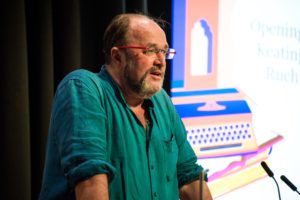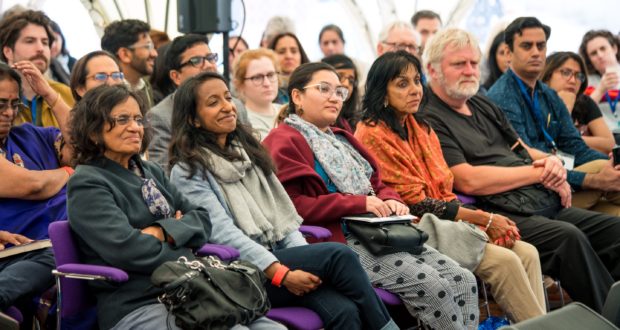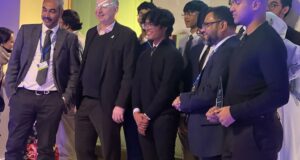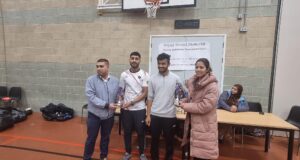
The sixth edition of ZEE JLF at the British Library, commenced on Friday with the opening address, entitled ‘Imagining Our Worlds’, presented by Festival Co-Directors Namita Gokhale and William Dalrymple, Festival Producer and Teamwork Arts Managing Director Sanjoy K Roy, British Library Chief Executive Roly Keating, and High Commissioner of India to the UK HE Ruchi Ghanshyam.
Gokhale said the Festival contributed to “something transformative,” which is happening in contemporary India, where the country’s youth is inspired to listen to some of the finest minds of India – “it is the place where India thinks aloud,” she said. Dalrymple exclaimed what an extraordinary thing it was to watch the growth of this Festival, pointing out that it had received a footfall of over a million in its recent edition in Jaipur. Roy acknowledged the contribution of literature towards the creation of empathy and equity in the world, observing that literature rejoins the contemporary world of growing divisiveness. Keating, highly appreciative of the collaboration between the British Library and the Festival, said that “the fit could not be closer”. Ghanshyam expressed how events like these develop an understanding of place and people, in the celebration of books and writers, and “life itself”.
The keynote address, ‘Of Cities and Empire’, was by Tristram Hunt, director of the V&A and former Labour MP, in which he discussed his book Ten Cities that Made an Empire. Hunt addressed the change in the recent discourse on colonialism: “The danger now is that as we step into the language of lawsuits and official apologies, the space for detached historical judgement has narrowed. We need to stop approaching Empire in terms of good or bad and think intelligently and enquiringly about its paradoxes, as many of them are still with us.”
In the discussion that followed, author and historian Shrabani Basu discussed Hunt’s book along with Shashi Tharoor’s Glorious Empire. Regarding the recent movement in decolonising of museums, Hunt addressed the political violence of the past and the economic inequality of the present that surrounds the building of these collections. Tharoor suggested that it is concerning that so many historical items like these have been displayed in museums without the acknowledgement of the colonial context.
On Saturday, audiences piled into sessions across the three sub-venues of the festival. In the session ‘The Gene Machine’, Nobel Laureate and President of the Royal Society Venki Ramakrishnan discussed his recent book with Roger Highfield of the Science Museum in London; Ramakrishnan observed that in order for science to flourish, it must allow and encourage freedom of thought and expression.
In ‘Masala Shakespeare’, Jonathan Gil Harris discussed his new book which celebrates a sub-genre of Hindi cinema popular in the late 1970s/80s: escapist crowd-pleasers called ‘masala films’ because they mixed tragedy with comedy, realism with over-the-top action, all punctuated with song and dance routines. The author draws a clear line from this timestamp back to Shakespeare, whose creative language was trans-cultural in much the same way as masala film. Gil Harris was joined by Varsha Panjwani, Lecturer in Shakespeare at NYU London, Cary Sawhney, Director of BFI London Indian Film Festival, and Rachel Dwyer, Professor of Indian Culture and Cinema at SOAS.
The session ‘The Islamic Enlightenment: Faith and Reason’ saw a discussion between Christopher de Bellaigue, an author and journalist who has worked extensively across the Muslim world, and festival co-director William Dalrymple, on the topic of tensions between faith and reason throughout the history of the Muslim world. De Bellaigue highlighted key historical social, political and technological changes that took place throughout early modern history and the exchange that occurred between the Islamic world and the Western world.
In ‘The Begum’, panelists Deepa Agarwal, Namita Gokhale, Tahmina Aziz Ayub and Muneeza Shamsie spoke with moderator Maha Khan Philips about Begum Ra’ana Liaqat Ali Khan, the pioneering First Lady of Pakistan in the mid-20th century – an activist, a feminist, a humanitarian, an academic, a diplomat and philanthropist and mother. In a new book, Pakistani writer Tahmina Aziz Ayub and Indian writer Deepa Aggarwal came together, in a cross-cultural, cross-border collaboration to tell the compelling story of this emblematic historical figure.
Other sessions on Saturday included: ‘Forgotten Masterpieces of Indian Art for East India Company’ (Malini Roy, Yuthika Sharma, Katherine Butler Schofield and Rosie Llewellyn-Jones in conversation with William Dalrymple), ‘Eve Was Shamed: How Justice Fails Women’ (Helena Kennedy, Avi Singh and Sunita Toor in conversation with Bee Rowlatt), ‘Tagore and the Bengal Renaissance’ (Reba Som and Bashabi Fraser in conversation with Somnath Batabyal), ‘Words Are All We Have’ (Anjali Joseph, Lijia Zhang and Romesh Gunesekera in conversation with Catharine Morris), ‘#Tharoorisms’ (Shashi Tharoor in conversation with Pragya Tiwari), ‘Mallika Victoria: Empress of India’ (Miles Taylor and Shrabani Basu in conversation with Vayu Naidu), ‘Meetings with Remarkable Manuscripts’ (Christopher de Hamel introduced by William Dalrymple), ‘Amritsar and the Patient Assassin’ (Anita Anand and Kim A. Wagner in conversation with Navtej Sarna), and ‘The Vanishing’ (Prerna Bindra, Ruth Padel and Raghu Chundawat in conversation with John Elliott).
The festival continues in London until Sunday 16th June.
The Jaipur Literature Festival in India is a global literary phenomenon, having hosted more than 2000 speakers and welcomed over a million book-lovers from across the globe over the past decade. In London, ZEE JLF at the British Library brings the same universal, democratic and inclusive core values of Jaipur’s annual literary carnival to the UK.
For more information on this year’s programme and to book tickets, visit http://jlflitfest.org/zee-jlf-at-british-library
 LBTV A Force for the community…
LBTV A Force for the community…



